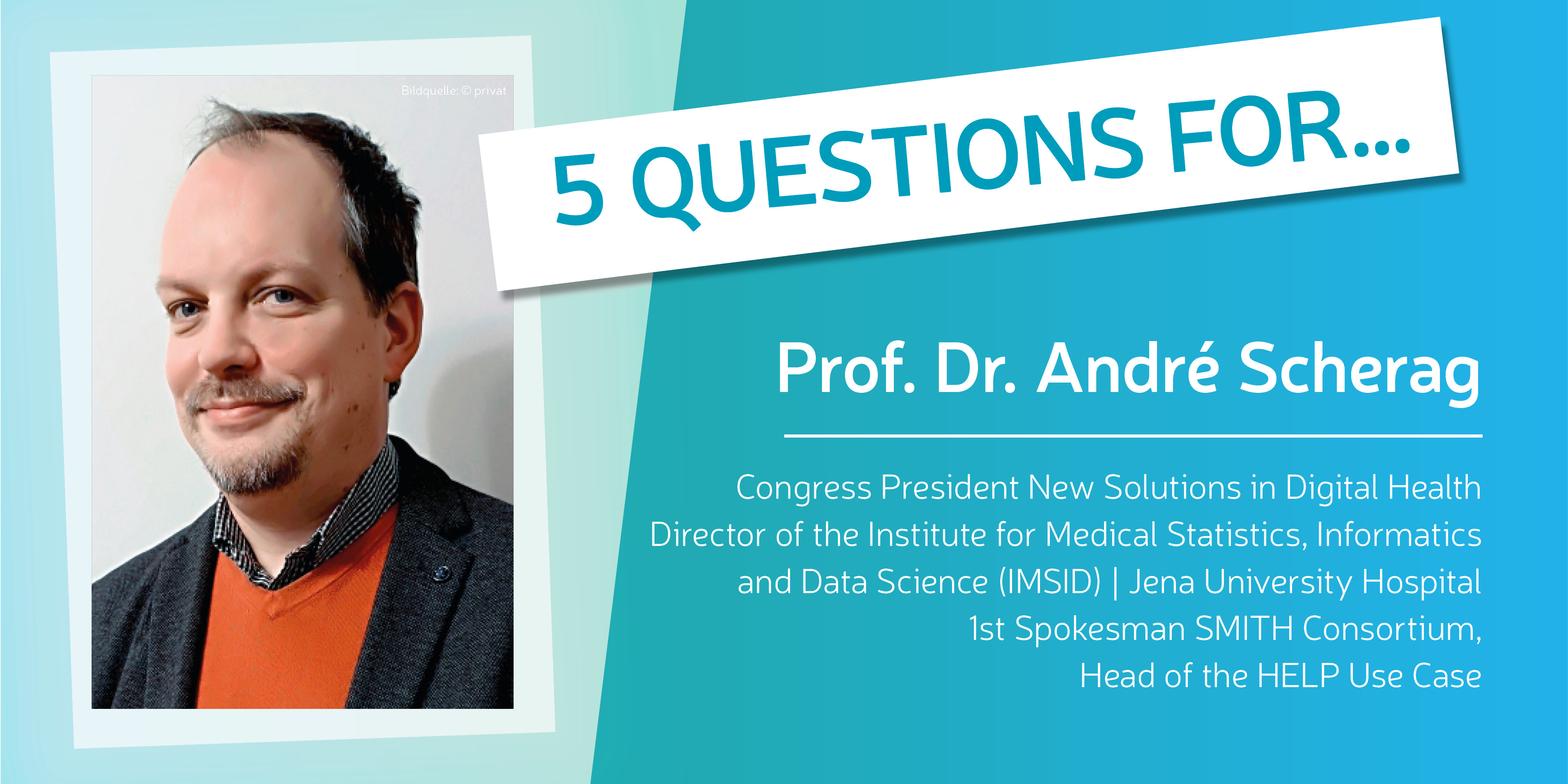
New Solutions in Digital Health | 5 Questions for… Prof. Dr. André Scherag
Prof. Dr. André Scherag has been Director of the Institute for Medical Statistics, Computer and Data Sciences at Jena University Hospital since 2017 and is thus also one of the central contributors to the SMITH Consortium of the Medical Informatics Initiative. As the consortium’s first speaker, he has been committed to the sustainable use of health care data in biomedical research since the beginning of the project and thus to improved patient care in the long term. For the SMITH Congress 2022, he will assume the role of Congress President this year. The second congress of the SMITH Consortium will take place from 28 – 29 June 2022 at the dbb forum in Berlin. Under the motto “New Solutions in Digital Health”, experts from research, healthcare, medical informatics, and science policy are invited to discuss sustainable networking between research and healthcare.
We spoke with Professor Scherag about the needs of digital medicine and why you should mark the SMITH Congress 2022 in your calendar.
The motto of this year’s SMITH Congress is “New Solutions in Digital Health”: What “new solutions” will be presented at the congress?
The motto picks up on that of the SMITH Congress “New Horizons in Digital Health” in 2019. With “New Solutions”, we want to show what we have already been able to achieve and what goals the SMITH Consortium and even more so the Medical Informatics Initiative are pursuing in the upcoming funding period. For example, we will present what the newly created Data Integration Centers have achieved, especially during the pandemic, and what boost we have received for digital medicine through new professorships and junior research groups. We will also highlight initial pilot projects that make the previous work by SMITH and the Medical Informatics Initiative accessible to regional health care and provide an outlook on European developments.
The congress will also be about the results of the SMITH Use Cases. You yourself are leading the HELP Use Case, which is dedicated to the targeted use of antibiotics in staphylococcal bloodstream infections. What are the key findings from HELP?
HELP is evaluating, among other things, the use of an app in a study designed to help ward physicians with these difficult-to-treat infections. The study is running on 133 wards at five university hospitals. We are eagerly awaiting the first results. In the process, we have learned that such software very quickly becomes a so-called medical device and thus has to meet complex regulatory requirements. Since the topic is important for the entire Medical Informatics Initiative, we have applied for a separate, higher-level consulting project for the next funding phase.
In addition to your activities in the SMITH Consortium, you are primarily a professor of clinical epidemiology at Jena University Hospital. How has the importance of digital health measures changed in the wake of the Covid-19 pandemic?
I have to make a small insertion here first: Epidemiology is historically derived from the field of epidemics, but as a subject of clinical epidemiology it is much broader. It also includes chronic diseases, for example. Epidemiology is more of a research approach that is unfortunately not as widespread in Germany as it is, for example, in the Anglo-Saxon world, from which also in the pandemic came the main contributions to clinical research. As far as digital health is concerned, the pandemic triggered a great many activities in parallel – unfortunately not always well coordinated due to the time pressure. In concrete terms, telemedicine solutions, for example, arrived in practice quickly and, in some cases, under duress as a result of the pandemic.
How do you ideally envision the future development of digitization in healthcare in Germany? Which country could be a role model here?
Unfortunately, digitilization in Germany is still seen too much as a purely technical challenge. But technology is only part of the solution. If I invest a lot of money in hardware, but no one can operate or even administer it, then that doesn’t help. In the Medical Informatics Initiative, a lot of things were done better here because investments were made in infrastructure that relies in particular on interdisciplinary teams. We hope that this will continue in the next phase starting in 2023. If you’re looking for a role model, you should look toward the UK. There, large, international, pragmatic, randomized trials with digital support were conducted in the pandemic, and as platform studies, they very quickly led to clinically useful answers.
Please finish the following sentence: Come to the SMITH Congress, because…
it is finally a face-to-face meeting again, where many exciting topics around “Digital Health” are discussed in a very practical way.

